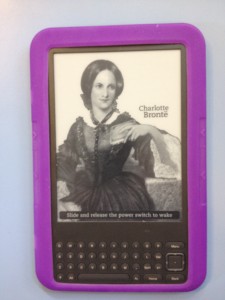The universe within.
This is not an example of outstanding writing. But I can’t help but warm to someone who can write this:
While reading you create a universe within you where your characters talk and move through breathtaking landscapes and everything is as unique as you and your imagination are.
You become the container of that universe where the book comes to life. You give life to something bigger than you, you become THE LIFE for your characters which exist only as long as you keep imagining them.
Read what else Daniel Scott has to say about reading, including why he’s never read an e-book and why he prefers to buy new rather than used books.
Nonfiction can appeal to youngsters who appear to be nonreaders
 I’m not trained in teaching children how to read, but I do usually hear about kids’ graduation to chapter books as a milestone in their process of learning to read. And my impression is that most of those chapter books are fiction. In this article Susie Wilde proclaims:
I’m not trained in teaching children how to read, but I do usually hear about kids’ graduation to chapter books as a milestone in their process of learning to read. And my impression is that most of those chapter books are fiction. In this article Susie Wilde proclaims:
Children who appear to be nonreaders are often nonfiction readers. While fiction demands the sequential flow, factual books permit stop-and-go reading.
It makes sense to me that some children may in fact prefer reading nonfiction rather than fiction, just as some adults do. According to Wilde, there are now many books available for those children. Read her recommendations for children in the following age groups: 3–5, 4–8, 8–11, 9 and up.
Reading with your ears: do audiobooks harm or help literature?
I have been a big fan of audiobooks since they first became available. My husband and I started by renting titles that came in boxes of several cassette tapes from Books on Tape. Now we’ve upgraded to downloadable books from Audible. It’s now also possible to borrow audiobooks electronically from many public libraries.
I’ve always believed that listening to an audiobook “counts” as having read the book as long as I listened to the unabridged version.
In this article in The Guardian Claire Armitstead wonders “if the oft-maligned rise of spoken word recordings isn’t actually improving our understanding.” She writes that hearing a recorded version of Colm Tóibín’s novel Nora Webster after she had read the book made her understand how the author “weaves a manner of thinking into a manner of speech, so that a whole era and society are contained in the narrator’s broken reporting of spoken sentences.”
Armitstead quotes from critic Harold Bloom, who believes that listening to audiobooks does not allow the whole cognitive process that reading from printed pages does, and from writer Neil Gaiman, who says that dismissing audiobooks is “just snobbery and foolishness.”
On this page you can listen to some audio versions of stories.
I continue to love audiobooks because they make me feel that I’m not wasting precious time when I listen while, driving, folding clothes, or plodding on the treadmill. However, I usually choose mysteries or thrillers to listen to rather than literary fiction. If I know I’m going to want to savor a writer’s style, I’ll read the book on either printed or ebook format.
And speaking of ebooks…
TeleRead
 I recently discovered this site, which deals with all things pertaining to e-books:
I recently discovered this site, which deals with all things pertaining to e-books:
TeleRead is for technogeeks who love books—and booklovers who love gadgets. We write about Kindle-type ereaders, phones, tablets, other devices and apps in a practical way. TeleRead runs book news and reviews and keeps up with other media appealing to smart booklovers. Along the way, we strive to help narrow the digital and reading divides.
You’ll find all kinds of articles here, including reviews of specific books and of e-reading gadgets as well as a list of sources for free e-books. There’s also information aimed at librarians and at authors interested in producing e-books of their work.

